
Some actors are flexible. And some are outright contortionists. Can you name six films Ann Dowd has been in? I’d be surprised if you could. Not because there are a small number; she has been acting for over 30 years and she’s been in at least 45 movies since 2000, not to mention countless TV appearances. Now that she’s won an Emmy for her portrayal of the hideous Aunt Lydia in The Handmaid’s Tale, she’s probably a bit more recognizable, but plenty of people still won’t make the connection because Dowd is an actor who really, seriously disappears into a character.
I’m not sure what enables some performers to do that trick-perhaps it’s humility, perhaps it’s empathy, perhaps some kind of channeling; maybe it’s not one single thing. Dowd has it, whatever it is.
If you’ve been watching The Handmaid’s Tale, Dowd has probably been making your skin crawl for quite a while now, with that smug Puritan vocal trill and the impassive wall-eyed stare she levels at Wives and Handmaids alike. It’s easy to deliver a shallow portrayal of a villain. You can cash in on an audience’s desire to hate someone, deliver a sadistic impulse or two and let it roll. There are plenty of actors who don’t appear to have learned something that seems very instinctive to Ann Dowd: Really satisfying bad guys manage to earn our empathy, or at least our sympathy, and not just with an inner origin story where the bully was once bullied in her own right. Beyond the rhetorical justifications for becoming a bad guy, there is the simple truth, which Dowd herself has pointed out, that no one is a villain in his or her own story. You get the sense Dowd is constantly asserting this with Aunt Lydia and with other frankly creepy characters she has portrayed. She has no defense mechanisms up around playing a character audiences are meant to despise. She refuses to fall into the trap of despising the character herself. She empathizes with the person she inhabits, and as a result so do we. When you’re talking about someone who tortures young women at the behest of a regressive totalitarian regime, that’s not nothing. She makes Aunt Lydia truly human—a courtesy the character was never afforded by Margaret Atwood’s source text.
There is something very familiar about Ann Dowd; she comes across as someone you know even when she’s playing a quite extreme character like Aunt Lydia. She has an approachability that might account for the preponderance of “nice lady” roles she had early on in her career—helpful sister, kindly mom, agreeable witness, nun.
It’s one of the ironies of being a top-tier character actor that you might go years working steadily without garnering a ton of recognition. High-plasticity actors by definition disappear into their characters. Ann Dowd is an upper quintile example, a shapeshifter who elevates everything she appears in. Her recent run of bad-guy roles (Aunt Lydia, Patti Levin in The Leftovers come to mind) have made her slightly more recognizable—we tend to remember those types more than the helpful nun in the episodic medical drama (or the nine different characters she appeared as in different parts of the Law and Order franchise)—but it seems likely that even after an Emmy, Ann Dowd will continue to fly low on the radar precisely because she is that good. How many actors genuinely disappear into the psyches of the characters they play? It’s surprisingly rare. There is a radical empathy at work whenever she is onscreen, and a genuine curiosity that makes even incidental characters come into brilliant resolution, but what you remember afterward is the character, not the performer.
Amy Glynn is not an outright contortionist.